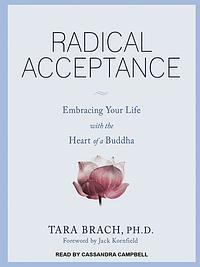Take a photo of a barcode or cover
Tara's take on radical acceptance and the difference it can make in your life is worth trying. Having finished the book, I am beginning to apply some of the principles. I know I will need to read this book again.
‘Radical Acceptance,’ a sincere introduction to Buddhism for the American reader, is targeted to a specific audience. Not a textbook, or a history, or a treatise, it’s more a Buddhist self-help volume for broken people.
There are a lot of broken people in the world, so this is a good thing. For those of us who don’t feel broken, who’ve spackled and painted our cracks and fissures such that we’re actually feeling great about life, it may seem like this book does not have much to offer.
But read on.
Regardless of whether we think we’re doing ok, we can always do better, right? Though author Tara Branch writes for the broken, there are lessons here for everyone: lessons in thoughtfulness, in consideration, in emotional presence. Yes, those lessons may not be written for you specifically, but there’s value there nonetheless.
And hey, if you are broken, this may really be the book for you.
Recommended for: people in crisis, but with a non-scholarly interest in Buddhism.
There are a lot of broken people in the world, so this is a good thing. For those of us who don’t feel broken, who’ve spackled and painted our cracks and fissures such that we’re actually feeling great about life, it may seem like this book does not have much to offer.
But read on.
Regardless of whether we think we’re doing ok, we can always do better, right? Though author Tara Branch writes for the broken, there are lessons here for everyone: lessons in thoughtfulness, in consideration, in emotional presence. Yes, those lessons may not be written for you specifically, but there’s value there nonetheless.
And hey, if you are broken, this may really be the book for you.
Recommended for: people in crisis, but with a non-scholarly interest in Buddhism.
Great book to use the principles taught in everyday life to help get through tough times. Actions are simple and have profound results.
Tara Brach offers such comfort with this book. She thoroughly explains the concept of radical acceptance through personal and client examples. Her Buddhism studies and career as a clinical psychologist is really interesting. She offers many guided meditations to work through the process of radical acceptance. I loved listening to this audiobook.
A life-changing book. I'm a devoted Brach fan and am addicted to her podcast dharma talks.
Graphic content that seemed unnecessarily detailed
Graphic: Incest, Rape, Self harm, Sexual assault, Sexual violence
I am an avid bookworm. I go through dozens of books each year, as well as a significant amount of podcasts. I try very hard to almost never abandon a book before completing it, but when I crank playback speed up to triple speed and repeatedly check to see how much of the audiobook is left, I know it isn't gripping me.
The author mixes sporadic, useful psychotherapy tips with a heavily religious approach towards Buddhism. She comes off as highly credulous and pretty "woo-woo". She starts off by telling us how she got involved in a meditation cult where the leader emotionally abused her, told her who to marry, and then publicly shamed her when she has a miscarriage, telling her that it was her fault. Then she left that cult and went on to other buddhist institutions and extended meditation retreats.
She mentions hypnosis in exactly one place in the book. Hypnosis is a real, well-proven phenomenon. The American Psychology Association has an entire division (Division 30) for hypnosis studies. I myself am a certified hypnotist. But she dives into it with absolutely no explanation, taking a pretty extreme example that will sound incredibly weird and off-putting to almost anyone new with hypnosis. Her exampe seemed highly exaggerated, or at least edited, for coherence and drama. If you do listen to this and are nonplussed by that segment, please ignore everything she says and do your own research on hypnosis.
As for the concept of "radical acceptance," she talks about how people tend to misunderstand what that means, but doesn't do a good job of defining what it does mean. She doesn't even provide examples to explain the concept of radical acceptance--only examples of common, poorly thought out arguments against it.
There may be a few acceptable bits here and there. Empathy is good. Meditation is good. Pausing before responding to things people say that bother you is good. But as a whole, it's hard to recommend this for anyone but die-hard Buddhist fans. There must be much better works to introduce people to the mindset.
The author mixes sporadic, useful psychotherapy tips with a heavily religious approach towards Buddhism. She comes off as highly credulous and pretty "woo-woo". She starts off by telling us how she got involved in a meditation cult where the leader emotionally abused her, told her who to marry, and then publicly shamed her when she has a miscarriage, telling her that it was her fault. Then she left that cult and went on to other buddhist institutions and extended meditation retreats.
She mentions hypnosis in exactly one place in the book. Hypnosis is a real, well-proven phenomenon. The American Psychology Association has an entire division (Division 30) for hypnosis studies. I myself am a certified hypnotist. But she dives into it with absolutely no explanation, taking a pretty extreme example that will sound incredibly weird and off-putting to almost anyone new with hypnosis. Her exampe seemed highly exaggerated, or at least edited, for coherence and drama. If you do listen to this and are nonplussed by that segment, please ignore everything she says and do your own research on hypnosis.
As for the concept of "radical acceptance," she talks about how people tend to misunderstand what that means, but doesn't do a good job of defining what it does mean. She doesn't even provide examples to explain the concept of radical acceptance--only examples of common, poorly thought out arguments against it.
There may be a few acceptable bits here and there. Empathy is good. Meditation is good. Pausing before responding to things people say that bother you is good. But as a whole, it's hard to recommend this for anyone but die-hard Buddhist fans. There must be much better works to introduce people to the mindset.
inspiring
reflective
medium-paced
Very helpful book for meditators to read to learn to deepen their practice. Lots of insights and anecdotes as well as meditations.
My friends make fun of my self help audiobooks but like marnie said lets all make fun of the pretty girl working on her emotional well being. Radical acceptance is hard of course but its real and i see it everywhere from taras yogi buddhism to my dbt practice to my ocd treatment to like just walking outside. I think this is the first time I’ve really accepted that unbearable feelings of pain are a result of an even stronger FEAR of pain. I was thinking throughout the listen wow its so interesting how blatant she is about her flaws and wondering why she wants us to listen to someone preaching all this who doesn’t even have it all figured it out then i was like WOAH im not radically accepting her as a flawed human being like the rest of us and of course she isn’t perfect and im projecting my judgement of myself and my own trance of unworthiness onto her. Awesome. Made me cry and smile. Highly recommend but none of yall listen to me
My therapist recommended this book to me, but we have very different tastes





